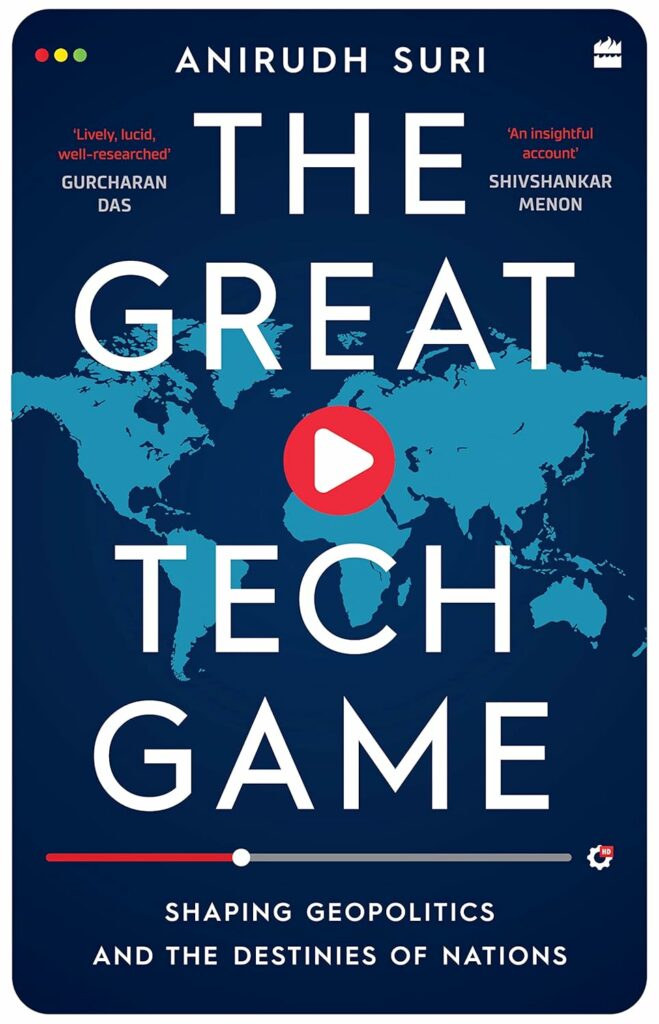
In a world increasingly controlled by algorithms, chips, and digital platforms, national power is no longer measured just by armies or oil. Now, it is determined by code, cloud infrastructure, and who leads the next wave of technological innovation. In The Great Tech Game: Shaping Geopolitics and the Destiny of Nations, author Anirudh Suri presents a strong argument: we are all players in a high-stakes game where technology shapes not only economic futures but also the sovereignty of nations.
Introduction: Technology as Geopolitical Terrain
In the 21st century, the balance of global power is not defined only by military strength, energy dominance, or territorial conquest. Instead, the world is involved in an unprecedented competition over control of digital infrastructure, data ecosystems, artificial intelligence, and the rules that will shape the future of technology.
Anirudh Suri provides a groundbreaking framework to help us understand this significant change. This book goes beyond being a typical tech read; it offers a deep, strategic, and interdisciplinary look at how technology is transforming industries, economies, international relations, governance, and human agency.
Technology Is the New Battlefield
Suri introduces a notable concept: we are currently engaged in a “Great Tech Game.” This game is similar in ambition and complexity to the 19th-century Great Game, where empires like Britain and Russia competed for influence in Central Asia. Today, the stakes are even higher. The players now include not only states but also multinational tech companies, digital platforms, venture capital networks, and ideological systems. The tools driving power are data, semiconductors, cloud infrastructure, 5G networks, quantum computing, and algorithms that influence our understanding of truth.
In this fast-changing environment, Suri points out a clear distinction between countries that shape the rules of the digital age and those that follow them. His geopolitical classification splits nations into:
– Players: Countries like the U.S. and China that drive innovation and set norms.
– Rule-Makers: Entities like the European Union that have regulatory power.
– Rule-Takers: Countries that consume technology but do not influence its direction.
– Subjects: Nations that remain digitally dependent, vulnerable, and voiceless.
This framework underscores the core argument of the book: in a world ruled by digital power, national destiny extends beyond borders. It revolves around who controls the digital infrastructure, platforms, and rules affecting everything from speech to commerce to warfare.
Unless it develops local capabilities in semiconductors, cybersecurity, AI, and cloud infrastructure and takes control of its data, India risks becoming a digital colony in a new techno-imperialism.
India’s Inflexion Point: From Rule-Taker to Rule-Maker
Among the most compelling parts of the book is Suri’s evaluation of India’s status in the global tech hierarchy. As one of the largest digital markets, with a young, tech-savvy population and a lively startup ecosystem, India has what it takes to become a leader in the Great Tech Game.
Suri recognises India’s achievements – Aadhaar, UPI, the India Stack, and the recent initiative for ONDC (Open Network for Digital Commerce) are bold and visionary projects. They show the potential for creating an inclusive, scalable digital public infrastructure. However, he cautions that India must go beyond being a consumer market for Western and Chinese tech giants. Unless it develops local capabilities in semiconductors, cybersecurity, AI, and cloud infrastructure and takes control of its data, India risks becoming a digital colony in a new techno-imperialism.
This issue goes beyond tech policy, Suri argues; it’s about national security, economic independence, and cultural identity.
A Global South Perspective: Bridging the Digital Divide
Another strong point of the book is Suri’s focus on the Global South. While the tech discussion is mostly led by the West and China, The Great Tech Game highlights how nations in Africa, Latin America, and Southeast Asia are also involved, albeit often marginalised, in this global competition.
Suri makes a persuasive case for “Digital Non-Alignment,” urging these regions to collaborate, claim digital sovereignty, and resist the binary choices offered by Washington and Beijing. For countries that have long been subjects in geopolitical conflicts, the digital era presents both risks and opportunities.
He argues that by forming strategic coalitions, investing in digital infrastructure, and leading in values (especially concerning ethical AI or data privacy), the Global South can change its role from follower to influencer in the global tech landscape.
 | Anirudh Suri is an Indian venture capitalist, policy advisor, and entrepreneur. He is the Managing Partner at India Internet Fund and has worked at the Government of India, McKinsey & Company, and the Council on Foreign Relations. Educated at Harvard, Wharton, and the London School of Economics, Suri’s unique interdisciplinary background allows him to navigate technology, strategy, and public policy with exceptional clarity. |
Tech, Power, and Values: Who Writes the Future?
Perhaps the most philosophical yet timely question the book poses is: Who sets the rules for our digital future? Suri believes the answer lies in recognising that technology is not value-neutral. Every platform, protocol, and algorithm embeds certain assumptions about truth, privacy, freedom, fairness, and power.
If democratic nations and inclusive institutions do not take action to shape these rules, authoritarian models may become the standard. The book discusses how China’s spread of digital authoritarianism, through facial recognition, surveillance technology, and platforms that support censorship, presents a challenge to open societies.
Suri’s policy expertise shines in this section. He not only identifies problems but also suggests practical, often bold strategies. From creating sovereign cloud ecosystems and regulating AI to promoting ethical data governance and investing in key tech sectors, The Great Tech Game is packed with actionable ideas for leaders, entrepreneurs, and technocrats alike.
We are not just technology users; we are participants in a vast game that will determine our rights, our economies, and our futures.
Critical Reflections
While the book is broad and visionary, it does have its limitations. Readers with technical backgrounds may find some parts lacking depth on the mechanics of emerging technologies like blockchain, Web3, or generative AI.
Additionally, some critics might say Suri’s optimism about state-driven strategies overlooks the complexities of democratic policymaking and resistance from established commercial interests. However, these critiques highlight the urgency of the book’s message: passive optimism is not a strategy in the digital age.
Conclusion: A Strategic Manual for the Digital Century
The Great Tech Game is a significant work, part history, part geopolitics, part tech guide, and part strategic playbook. Anirudh Suri connects innovation, power, and national destiny in a way that is both intellectually strong and engaging.
For policymakers, it provides a plan for digital sovereignty. For entrepreneurs, it clarifies the stakes of global competition. For students and analysts, it offers a detailed framework to understand the tech-driven reordering of the world.
But perhaps most importantly, for citizens everywhere, it serves as a wake-up call. We are not just technology users; we are participants in a vast game that will determine our rights, our economies, and our futures. The question is no longer whether your nation is in the game. The real question is: Are you playing to win?
| Title: The Great Tech Game: Shaping Geopolitics and the Destiny of Nations Author: Anirudh Suri Publishers: Harper Business (2022) Price: ₹632 (Hardcover) SW Ratings: ***** |
Daljeet Singh holds a BTech in Computer Science and is currently pursuing an MA in Political Science. His interests range across geopolitics, international relations, and technology. An avid reader and writer, he is passionate about exploring the intersections of these fields. Views expressed are the author’s own.
